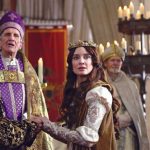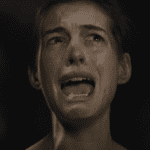 Movies and TV
Movies and TV  Movies and TV
Movies and TV  Creepy
Creepy 10 Eerie & Mysterious Ghosts of the Pacific Coast
 Weird Stuff
Weird Stuff 10 Typos That Accidentally Changed History
 History
History 10 Times Trickery Won Battles
 Technology
Technology 10 Awesome Upgrades to Common Household Items
 Misconceptions
Misconceptions 10 Hilarious (and Totally Wrong) Misconceptions About Childbirth
 Weird Stuff
Weird Stuff 10 Warning Labels That Exist Because Someone Actually Tried It
 Health
Health Ten Confounding New Inventions from the World of Biomedicine
 Creepy
Creepy 10 Death Superstitions That Will Give You the Creeps
 Movies and TV
Movies and TV 10 Movies That Get Elite Jobs Right, According to Experts
 Movies and TV
Movies and TV 10 Most Realistic Medical TV Shows of All Time
 Creepy
Creepy 10 Eerie & Mysterious Ghosts of the Pacific Coast
 Weird Stuff
Weird Stuff 10 Typos That Accidentally Changed History
Who's Behind Listverse?

Jamie Frater
Head Editor
Jamie founded Listverse due to an insatiable desire to share fascinating, obscure, and bizarre facts. He has been a guest speaker on numerous national radio and television stations and is a five time published author.
More About Us History
History 10 Times Trickery Won Battles
 Technology
Technology 10 Awesome Upgrades to Common Household Items
 Misconceptions
Misconceptions 10 Hilarious (and Totally Wrong) Misconceptions About Childbirth
 Weird Stuff
Weird Stuff 10 Warning Labels That Exist Because Someone Actually Tried It
 Health
Health Ten Confounding New Inventions from the World of Biomedicine
 Creepy
Creepy 10 Death Superstitions That Will Give You the Creeps
 Movies and TV
Movies and TV 10 Movies That Get Elite Jobs Right, According to Experts
Top 10 Best Book to Musical Adaptions
Most of the world’s most popular stories started as books but were popularized as movies, TV shows, or other media. Here are some of the most faithful and toe-tapping musicals that started as books.
Related: 10 Captivating Performances In Musical Films
10 The Works of Dr. Suess–Suessical
Dr. Suess is one of the most beloved children’s writers in the world, and his collection of silly and fanciful stories and drawings is iconic throughout America. The musical based on many of his works, Suessical, essentially tells the story of Horton Hears a Who! but with a little more Suess thrown in throughout. The Cat in the Hat narrates the story, for example, and the Grinch makes a guest appearance.
But the one thing that really sets Dr. Suess’s stories apart from others is their themes. Suess was a well-known political artist as well as a children’s writer, and many of these adult themes come through perfectly through his books. The Butter Battle Book, for example, serves as a metaphor for the impending Cold War. Seussical lacks any moral beyond the basic “be kind to others,” so although the musical is a fun time, it’s not quite what Suess was going for.[1]
9 Wicked
It may surprise some to see one of the most popular musicals of all time so far from number one on this list. Still, anyone who has actually read the book Wicked that the musical is based on will understand where I’m coming from.
The plot of the musical is whimsical, magical, and fun, following green witch Elphaba as she struggles to fit in at boarding school. Along the way, she meets her new best friend, Glinda, but the relationship becomes more strained until the two become completely estranged. It’s a wonderful retelling of the story of Dorothy and Oz, where Oz is not such a wonderful place as readers of Frank Baum’s book might think.
While the musical does follow the same general plot, there is a lot of exposition. We see Elphaba grow up rather than being thrown into school as a young adult, and the readers spend a lot of time getting to know Elphaba’s parents and siblings, who play an essential role in the book but are unseen in the musical.
The book is also much darker than the musical, with an emphasis on more adult themes such as sex, alcohol, drugs, adultery, animal rights, and religion. Basically, any issue you can think of is included in the book. That’s not to say the book isn’t as good as the musical: They’re just very different. While Wicked the musical is a classic first musical for children, the book definitely deals with more complicated and dark issues that may require more brain power than singing “Defying Gravity.”[2]
8 Be More Chill
This sci-fi/coming-of-age novel wasn’t much of a hit when it first came out in 2004, but the musical premiere in 2015 was immediately met with a huge online following of teens. While the novel and musical share a similar plot, with a nerdy teenager taking a mysterious pill to become cooler at school, the musical gives more depth to all characters. The book is more of a deep dive into the mind of a gross teenage boy, while the musical includes songs that humanize female characters who, in the book, are just seen as objects for the main character to lust over.[3]
7 Les Misérables
Being able to adapt a brick of a book like Les Misérables into a tight three-hour production takes a lot of work, and it shows. Although there’s a lot to include due to the sheer size of the source material, the musical condenses it all while also staying true to the characters and general plot. Some small things are changed—the minor character of Gavroche is no longer the younger brother of Eponine—and the full background of most characters is not explained like they are in the novel, nor is the history quite as accurate.
Another large change is actually for the better (for the most part) as the viewers of the musical are not subjected to the long chapters of the book that are dedicated to a social commentary of the time and simply describing the scenery. The musical is more focused on the plot, which, in this case, makes it a little more bearable. While some lines of the show are taken directly from the book, one of the downsides of this adaption is that we don’t get to enjoy Victor Hugo’s elaborate and gorgeous prose.[4]
6 Oliver Twist–Oliver!
Oliver! is one of those musicals I always find myself scoffing at, wondering why they decided to make such a depressing book into a musical, generally a fairly upbeat medium. But listening to the songs always reminds me that a musical can be many things, and Oliver! is a fitting example of this.
Although the title of the show, like the book, focuses on one character, the musical takes a more holistic look at the plot. Orphan Oliver isn’t the only character who gets a number that brings down the house. Prostitute Nancy sings about her abusive boyfriend, while the horrifyingly cruel Bill Sykes sings about the power he has. The Artful Dodger welcomes Oliver into his makeshift family, and the story is told in a way that engages the audience but also stays true to the novel, showing the depths of love and hatred humans can hold.[5]
5 Matilda
Roald Dahl has written more classic children’s novels than almost any other modern author: Willy Wonka and the Chocolate Factory, The BFG, The Witches, James and the Giant Peach, and The Fantastic Mr. Fox, just to name a few. Matilda (the musical) does a remarkable job of taking the characters we know and love and elevating them through music and choreography. Trunchbull yanking poor Amanda Thripp’s pigtails is just one example of the way the show manages to amaze and surprise, even though the plot is fairly well-known.[6]
4 The Harry Potter Series–A Very Potter Musical
Even though it’s never been officially licensed, A Very Potter Musical is one of the best adaptations of the wildly popular book franchise I’ve ever seen. Written by a group of college students from the University of Michigan, this show stays more faithful to the characters than any of the films. Harry is arrogant and annoying, Ron is rude and harsh, and Hermione is timid but intelligent. Then there’s Draco. Well, it’s hard to describe what Draco is in this production, but it involves a lot of wizard racism and rolling around on the ground.
With catchy tunes and plenty of laugh-out-loud moments, A Very Potter Musical takes the characters we know and love and blows them into caricatures of themselves with hilarity that you wouldn’t expect from such a low-budget creative team.[7]
3 War and Peace–Natasha, Pierre, and the Great Comet of 1812
War and Peace is over a thousand pages long, but don’t worry, Natasha, Pierre, and the Great Comet of 1812 only tells a small sliver of the story. Because the book itself is so long, there are many characters, all of whom are introduced in the opening song. This song, “Prologue,” sets up the rest of the musical by straight up letting the audience know that this is a “complicated Russian novel” and “everyone’s got nine different names,” so if you get confused, you can “look it up in your program, we’d appreciate it, thanks a lot!”
Neither too long nor too short, this show is the perfect introduction to Tolstoy’s notorious novel for those looking to experience the beautiful prose and amazingly relatable characters that make the book such a classic without taking the time to read all twelve hundred pages.[8]
2 Goodbye to Berlin–Cabaret
Goodbye to Berlin was written by Christopher Isherwood and takes place during Adolf Hitler’s rise to power in the 1930s. The book focuses on the main character, Christopher, who is based on Isherwood himself, making the book a memoir of sorts. The musical features a larger cast of characters, including the outlandish Emcee. He narrates the show while reflecting the nature of seedy cabaret joints in Berlin at the time, but the story still rotates around writer Cliff and his troubles with cabaret singer Sally. The Emcee is one of the most interesting characters in musical theater, not only moving the show along in an entertaining way but also entering the story and showing how the Third Reich truly changed Germany.
Isherwood’s book is meant to be a portrait of both the good and the bad of Berlin in the 1930s, combining the sweet taste of freedom with the tang of scandal and violence that never quite leaves the city alone. Songs like “Money” and “Maybe This Time” are bittersweet tunes that truly encapsulate the desires of young people versus the reality and consequences of life. All this, along with the knowledge the audience has that soon the country will be war-torn and militarized, makes for an amazingly beautiful spectacle.[9]
1 Ragtime
E.L. Doctrow’s 1975 book is one of truly expansive proportions. Multiple seemingly unrelated plots and characters weave together to create a tapestry of Americana and turn-of-the-century history. The problems characters face range from classic tropes such as love and family to terrorism and immigration, but all are connected in a distinctly American voice.
With a book as complicated and character-filled as Ragtime, it’s amazing that the musical comes together so cohesively, but it does. Like the book, the musical’s “main characters”—if they can be called that among such a large ensemble—consists of Mother, Father, the little boy, Tateh and his daughter, and Coalhouse Walker, a Black ragtime musician who finds himself in the suburban home of the New Rochelle family.
One of the most unique aspects of the musical is its ability to give a separate voice to so many characters the audience already has associations with. Henry Ford’s upbeat working song, Evelyn Nesbit’s vaudeville-esque recount of her husband’s trial for murder, Harry Houdini’s desperation for something to believe in, and Emma Goldman’s fierce workers’ anthems are just some examples of the way American history come to life both on the stage and within the pages of the book.[10]








